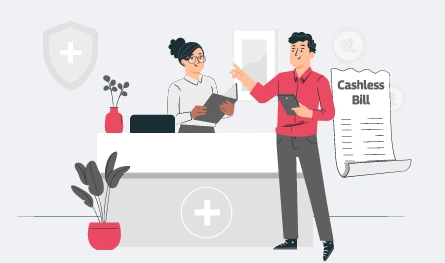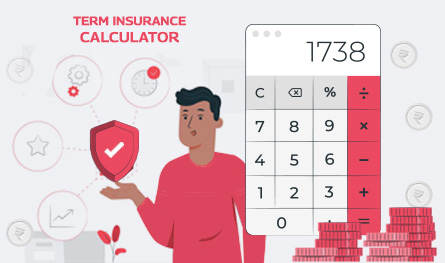Related Articles
 Jan 08, 2025
Jan 08, 2025
Is Varicose Vein surgery covered under the health insurance policy in India
 Health Insurance
Health Insurance

In health insurance, the cashless facility is a feature that allows policyholders to avail of cashless hospitalization facilities each time they get hospitalized. Earlier this facility was applicable only in the network hospitals of insurance companies. However, it is now available across all hospitals as per a move initiated by the General Insurance Council (CIG).

It is a type of health insurance policy in which policyholders can avail of healthcare treatment in a network hospital, and the insurer pays the bill for the treatment directly to the hospital. Hence, the policyholder doesn’t have to spend money from the individual’s pocket as the insurance provider settles the bill directly.
The GIC, along with the health and general insurance companies in India, has started the ‘Cashless Everywhere’ initiative with effect from January 25, 2024. As part of this initiative, cashless treatment under health insurance policies will be extended to all hospitals in the country, whether the hospital is under the health insurance company’s network or not. Hence, individuals covered under a health plan can now avail of a cashless hospitalization facility in any hospital of their choice even if it is not under the network of the insurer.
This makes it convenient for the policyholders to choose a hospital and the doctors of their choice in case of a planned hospitalization. It also helps victims and their family members in case of emergency hospitalization due to an accident.
You may note that so far, health insurance policyholders have been allowed to get cashless hospitalization and treatment facilities only in the network hospitals that the health policy provider/insurer has tied up with. So, if an insured avails of hospitalization and treatment in a non-network hospital, they are likely to pay the bill or the amount at discharge from their pocket and can reimburse the same later from the insurer. However, the introduction of the new initiative of ‘Cashless Everywhere’ will allow policyholders to avail of treatment at any hospital of their choice and get a cashless facility under the best cashless health insurance plan.
The ‘Cashless Everywhere’ initiative will allow the policyholder to receive treatment in any of their preferred hospitals through a cashless treatment facility. Thus, even if the hospital you are admitted to is not in the network of your insurance company, you can still receive a cashless treatment, and your insurer will settle the bill directly with the hospital.
Hospitals that are registered under the Clinical Establishment Act and have at least 15 beds can now offer cashless hospitalization facilities. This gives policyholders access to over 40,000 hospitals in the country at present for treatment and hospitalization.
Under the ‘Cashless Everywhere’ initiative, customers are required to be careful about informing the insurance company 48 hours before getting a planned hospital admission and within 48 hours of emergency hospitalization.
However, besides the claims option, other processes of availing health insurance, including premium estimation, remain the same. Hence, no changes in the premium price are expected. The policyholders need to raise the claim under the insurance policy as per the terms and conditions mentioned in the policy document.
Under the ‘Cashless Everywhere’ initiative, policyholders can avail of treatment at non-network hospitals as per the rules/guidelines set by the GIC. The GIC has mentioned three rules to be followed by the health insurance policyholders:
1) Inform the insurer at least 48 hours before the admission (for planned treatment)
2) Inform the insurer within 48 hours of admission (for emergency treatment)
3) The claim would be acceptable in accordance with the terms and conditions of the policy, while the cashless treatment would be allowed in accordance with the operating guidelines of the insurer
The ‘Cashless Everywhere’ initiative has several benefits. Some of them are included below:
For the hospitals, there are certain criteria that they should satisfy to offer cashless treatment. This includes having at least 15 beds in the hospital. Also, the policyholder is expected to inform the insurer before 48 hours of a planned treatment/surgery and within 48 hours of an accidental hospitalization. Moreover, the hospital must send a request for cashless pre-authorization to the insurer to get the cashless activation process initiated. Once the authorization is approved, the hospital must submit an agreement, like a memorandum of understanding (MoU). After this step, cashless authorization will be given to the hospital even if it is not in the network of the insurance company. This facility can be used by remote hospitals with minimal technological access by simply sending an email with a cashless authorization request to the insurer.
Below are some terms and conditions related to the Cashless Everywhere initiative:
Below is the stepwise procedure to provide a cashless everywhere facility in a non-network hospital:
The facility of cashless everywhere can be availed of only if the pre-authorization form reaches the insurance provider 48 hours before a planned treatment/procedure and within 24 hours of an Emergency admission to intimate the insurer.
The Hospitals have to comply with Standards and Benchmarks for hospitals in the insurer’s network. Also, note that hospitals that are blacklisted or suspended by any insurer/government/TPA or if any fraudulent cases/activities have been reported against them will not be entertained
The TPA should check if a hospital is already on the panel of any insurer/TPA. If so, TPA may try to get the agreed rates with that insurer/TPA.
When the final approval of offering a cashless facility is received from a hospital, the TPA should get an MOU signed (temporary and valid for 3 months) by the TPA and the hospital. This MOU serves as a part of the claim documents at the time of processing the claim. Once the MOU expires, a fresh MOU should be issued for new transactions.
A cashless health card is a card issued by an insurance provider for the policyholder to avail of a cashless treatment at a network hospital. This makes it smooth and hassle-free for the policyholder to receive medical treatment.
To track the mediclaim cashless hospital list of your insurer, you can visit the official portal of the insurance company and search there.
Several of the best health insurance companies offer some of the best cashless health insurance plans in India. A few prominent names include;
~ Care health insurance company
~ Star health insurance company
~ Niva Bupa Health Insurance Company
~ Bajaj Allianz health insurance company
~ ICICI Lombard Health Insurance company

Paybima Team
Paybima is an Indian insurance aggregator on a mission to make insurance simple for people. Paybima is the Digital arm of the already established and trusted Mahindra Insurance Brokers Ltd., a reputed name in the insurance broking industry with 17 years of experience. Paybima promises you the easy-to-access online platform to buy insurance policies, and also extend their unrelented assistance with all your policy related queries and services.

If you think of life insurance, chances are you are picturing something people buy in their 30s or 40s. But what if you are 65 or older and just getting started? The good news is that you are never too late. Whether you are thinking of easing the financial burden on your family, covering final expenses, or simply leaving behind a legacy, there are life insurance options tailored just for you.
This article will be a guide to life insurance for senior citizens above 65 years, explaining why it is important, the type of insurance options, and how to get the right policy for you.


Have you ever caught yourself lost in illusions about your daughter's future events, such as her university convocation and first day at work? Her university convocation. When she embarks upon her initial job after graduation will be the day.


Let’s be honest – life insurance planning isn’t exactly someone’s weekend hobby. It is the financial equivalent of flossing: we understand its importance, but we tend to put it off. But somewhere between balancing work and life, you might realise you need to have a solid plan in place – just in case.


We all know that health insurance policies offer a long list of inclusions. However, exclusions are also a crucial aspect of every policy. Overlooking policy documents can surprise you with hidden clauses that you didn't even know existed. To avoid such unpleasant situations and unexpected expenses during medical emergencies, it is crucial to uncover hidden clauses your health insurance policy may contain. When you buy health insurance online, make sure to know all about the policy before signing the document.
From least known exclusions to waiting periods and conditions in the fine print, hidden clauses can affect your overall experience. To help you out, here are the top hidden clauses of a health insurance policy that you should know.

.png)
Lymphocytes, a kind of white blood cells, are an extraordinary army of defenders functioning in the bustling world of our immune system for our body’s immune defence. Let’s know about these mighty warriors who are continually waging war against invading pathogens, viruses, and microbes in detail.
